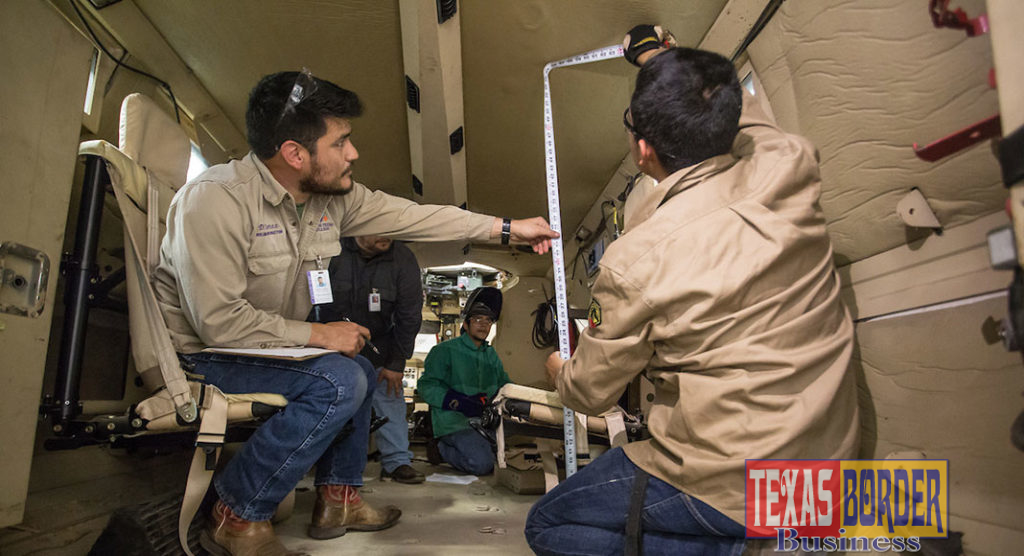
Texas Border Business
MCALLEN, TEXAS –When Edinburg Chief of Police Cesar Torres realized that his newly acquired, Mine-Resistant Ambush Protected (MRAP) SWAT utility vehicle had practical deficiencies, he could have seen it as a problem. Instead, he saw it as an opportunity for a regional collaboration with South Texas College.
“I chose STC for this project due to working with STC in the past and getting to know Dean Mario Reyna,” says Edinburg Chief of Police Cesar Torres. “The STC Welding program is organized and the projects completed in the past have exceeded my expectations. It is Edinburg Police Department’s honor to have younger students to be part of this.”
When Dean Reyna of South Texas College’s Division of Business, Public Safety, and Technology brought the project to Sara Lozano, Program Chair of the Architectural, Engineering, and Design Technology Program, she and her faculty jumped at the chance.
“We are always looking for opportunities like these,” says Lozano. “It’s really powerful for students to get hands-on experience working on projects that have an impact on the community, so they’re not just reading from a book about a fictional project. These types of projects have a lasting impact on them.”
Today, STC’s Architectural & Engineering Design Technology, Automotive/Diesel, Advanced Manufacturing, and Welding programs are learning a lesson in real-world collaboration as they actively retrofit the vehicle for urban use by the heroic SWAT members whose lives may one day depend on it.
Esmeralda Leija, an AEDT student who aspires to become a licensed architect, explains the value of such collaborations: “Being in the architectural industry means you have to have knowledge in many fields and be able to work with different components,” she says. “So the ability to learn what it’s like to work on different projects is very useful. The SWAT retrofitting project will allow us as students to gain practical experience by applying our knowledge of the technology we are learning in the classroom.”
This knowledge is especially important as the green revolution and the development of new technologies continue to drive demand for qualified employees within the engineering, automotive, advanced manufacturing, and welding industries. According to the U.S. Bureau of Labor Statistics, this demand is why experienced workers in these fields can command salaries of up to $99,000 per year, with the right credentials.
According to Lozano, who grew up in Edcouch-Elsa where her father was a business owner and her mother a teacher, collaborating with regional businesses teaches students important lessons not just about working together, but about the impact that their work has on their community.
“That’s something all of our programs in this division have in common—we have a direct impact on the world around us,” says Lozano. “We want our students to all leave with some kind of external experience on a project that has gotten them involved with the community.”
Last semester, AEDT students partnered with STC’s Construction Supervision program to design a life-size cadet-training cityscape for STC’s new Regional Center for Public Safety Excellence. After completing designs, students discussed materials, hypothetical budgets, and various other real-world complications that are endemic to such projects.
Leija describes another collaborative project, in which STC students partnered with students from the Instituto Tecnológico de Reynosa in Mexico to create a design proposal for a renovation of STC’s Technology Campus atrium in McAllen: “The fact that we were able to collaborate to share our knowledge of different software and design processes allowed us as students to gain experience writing an architecture design proposal, despite the boundaries like speaking different languages and living in different countries.”
For the SWAT vehicle project, faculty developed a set of departmental responsibilities that mimicked the kind of work students might be called on to do in the real world.
Selected students from the AEDT department are in charge of taking measurements and creating blueprints using AutoCAD, the industry-standard drafting software. When those blueprints are complete, Advanced Manufacturing will take them and, along with Welding, fabricate and attach the necessary parts. And when the replacement parts come in, the Automotive/Diesel program will apply their skills to fixing the A/C issue.
The final product, which Lozano hopes will be finished by the end of Spring 2019, will include new skirt rails for team members to stand on, bench seats to replace the less space-efficient bucket seats, a new A/C system, and a front push ram.
As for the future, Lozano is hoping for more of the same.
“Our faculty are always thinking in these terms. They take the initiative and run with it,” she says. “After Dean Reyna brought the SWAT project to us, I took it to my faculty and laid out the opportunity we’d been given and they jumped on it… Basically, we try to practice what we preach when it comes to collaboration. I love our faculty. This is what makes our team unique!”
For more information about the many workforce-ready programs within STC’s Division of Business, Public Safety, and Technology, please visit https://bt.southtexascollege.edu/















